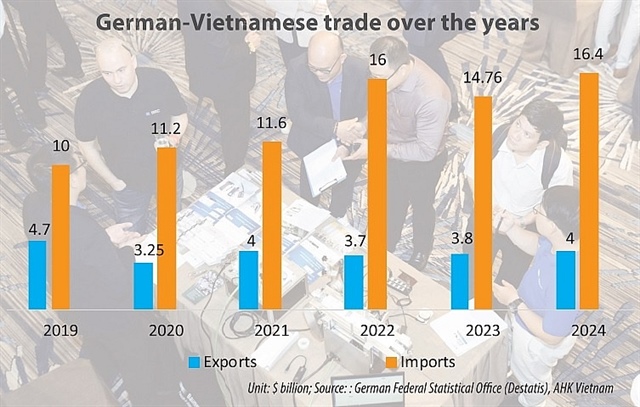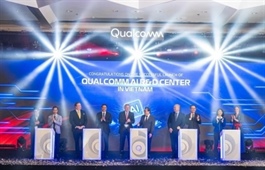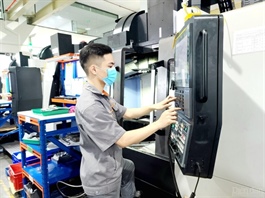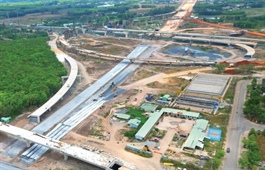German expertise meets Vietnamese ambition
German expertise meets Vietnamese ambition
Not long ago, Vietnam was best known for low-cost manufacturing. Today, it is emerging as a strategic player in global supply chains, and a key partner for German industry.
Decades of bilateral cooperation have laid a strong foundation. Recent global disruptions have exposed the fragility of international trade and underscored the importance of resilient, trusted partnerships. For countries deeply integrated into global value chains, closer collaboration is no longer optional – it is essential.

Peter Kompalla, chief representative, Delegation of German Industry and Commerce in Vietnam (AHK Vietnam) |
As trade tensions rise and protectionist policies gain ground, particularly in major economies like the United States, German companies are seeking stable, cost-efficient, and forward-looking markets. Vietnam is one of them.
At the heart of Southeast Asia, it offers not just competitive labour costs but also modern industrial zones, solid infrastructure, and a young, tech-savvy workforce.
By 2024, Vietnam attracted over $38 billion in foreign direct investment, reflecting global confidence in its economic trajectory. Germany alone accounts for 490 active investment projects worth $2.82 billion. These projects span across electronics, automotive, industrial machinery, and more recently, IT and renewable energy.
Long-term investors like Bosch, Schaeffler, and Siemens have significantly expanded their operations in Vietnam. Bosch, for instance, runs one of its largest research and development centres in Southeast Asia out of Ho Chi Minh City, employing hundreds of engineers focused on mobility solutions, embedded software, and product innovation.
Schaeffler continues to scale its advanced manufacturing site in the southern province of Dong Nai, while Siemens supports infrastructure and digital industry development across multiple provinces.
In addition, mid-sized and family-owned enterprises from Germany, known as the Mittelstand, are increasingly exploring Vietnam as an investment destination. These firms bring high-quality engineering, sustainable business practices, and a long-term mindset, fitting well with Vietnam’s vision of high-tech industrialisation.
This dynamic is supported by both the German Business Association and AHK Vietnam. While the former brings together a vibrant network of investors and decision-makers, AHK Vietnam provides strategic guidance, local insight, and practical support to over 700 German companies each year.
Ties that reflect transformation
This evolving partnership is also reflected in trade. In 2024, bilateral commerce grew by 9.6 per cent, reaching $20.4 billion. Over a quarter of Vietnam’s exports to Germany are now electronics and machinery, alongside textiles, coffee, and footwear.
Conversely, Germany remains a key supplier of high-tech inputs such as aircraft components, precision machinery, pharmaceuticals, and specialty chemicals.
This growing interdependence is more than transactional. It reflects a strategic alignment grounded in mutual trust, innovation, and sustainable growth.
Vietnam’s digital economy is projected to account for 25 per cent of GDP in the coming years. Government initiatives in digital infrastructure, e-commerce, and cashless payments, along with a rising middle class and a tech-savvy population, are fuelling this momentum.
One of the most dynamic developments lies in Vietnam’s emergence as a competitive IT outsourcing and technology development hub. While India remains the global giant in this field, Vietnam is catching up fast – offering a compelling mix of skilled labour, innovation mindset, and cost-efficiency. Major tech players such as Intel, Samsung, IBM, and Qualcomm have established a growing footprint in the country.
Vietnam’s universities produce over 50,000 IT graduates per year, especially from institutions like Ho Chi Minh City University of Technology and Hanoi University of Science and Technology. The National Digital Transformation Programme aims to build a digital-first economy, further fuelling demand for software development, product engineering, and tech-enabled services.
German companies increasingly leverage Vietnam for digital services, product customisation, and smart factory technologies. Software developers in Vietnam are making the country highly attractive for building scalable tech teams.
Vietnam excels in long-term software projects and agile-based development models, particularly in sectors like fintech, e-commerce, industrial automation, and manufacturing. The country’s improving English proficiency and strong work ethic further enhance its appeal.
Challenges, such as communication nuances and regional differences in infrastructure, exist, but are increasingly manageable with cultural training and reliable local partners.
|
Investing and modernising
Vietnam’s transformation into a high-tech production hub is accelerating. The recent AHK Vietnam symposium ‘Factory Automation – Made in Germany’ has served as a key platform connecting advanced German technologies with Vietnam’s rapidly growing modern manufacturing sector, supporting its transformation into a high-tech production hub.
German companies bring expertise not only in automation but also in smart factories, digital applications, and energy efficiency solutions, addressing Vietnam’s evolving industrial needs.
The #50VietDuc campaign marks 50 years of German-Vietnamese diplomatic relations. Recently, this commitment was reaffirmed in a high-level exchange between Vietnam’s Deputy Prime Minister, Minister of Foreign Affairs Bui Thanh Son and Germany’s Minister of State Johann Wadephul. The dialogue emphasised deepening cooperation in renewables, digitalisation, sustainable manufacturing, and vocational training.
The EU-Vietnam Free Trade Agreement further enhances this cooperation, lowering tariffs and providing regulatory clarity. Vietnam has signed 17 free trade deals, showing that it is not just open to trade, but actively shaping it.
Of course, challenges remain. Infrastructure projects such as the North-South high-speed railway demand advanced technologies and experience. German firms are well-positioned to contribute, but navigating Vietnam’s regulatory and regional complexities requires trusted local partners.
German companies – particularly the Mittelstand, with its values of quality, responsibility, and long-term perspective – seek more than just market data. They need dialogue, cultural understanding, and a bridge between two business worlds.
That is the role AHK Vietnam proudly plays: supporting companies through every step of their market journey. As the official representation of German business in Vietnam, we connect ideas with opportunity, innovation with market entry, and ambition with execution.
The German-Vietnamese business relationship is evolving into something greater than trade and investment. It is becoming a future-focused partnership, grounded in innovation, sustainability, and shared prosperity.
- 10:47 17/06/2025



























